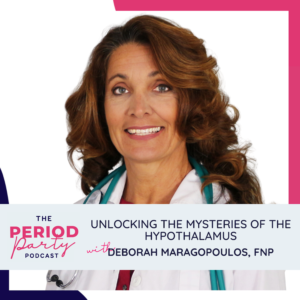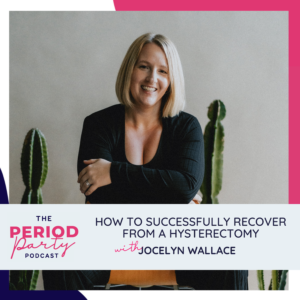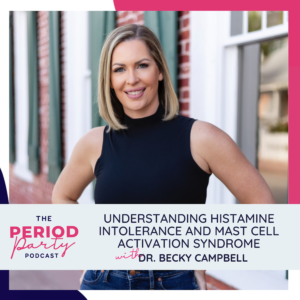What if you have no idea when your next period will show up? If your period comes every few weeks, every few months, or some combination of the two, then you have an irregular period and you’re not alone. Worrying about when your next period will make an appearance is something that no one is interested in.
In this April solo series, I’m sharing on topics related to periods and hormones that have been the most problematic for so many of my readers, followers, and listeners over the years and in this second episode, I’m talking about the possible causes for irregular periods and some basic solutions.
The inspiration for this series is my first book, Fix Your Period, which will be out in the world on April 28th and is available now for pre-order (with some incredible bonuses worth over $500!). During this time, I want to give you practical and valuable information that will help move the needle on your health.
1. Polycystic ovary syndrome (PCOS) may be to blame for your irregular periods.
PCOS is an inflammatory endocrine disorder that prevents the ovarian follicles from reaching the ovulation stage, causing significant delays in ovulation (or even preventing it) which then causes irregular or nonexistent periods.
It affects over 100 million women worldwide making it the most common endocrine disorder in women of reproductive age and the leading cause of ovulatory infertility.
Women with PCOS tend to have too much estrogen and testosterone (an androgen), which disrupt normal ovulation, leading to lowered progesterone.
Here’s how that happens: An egg is typically released by your ovaries to be fertilized every month, but women with PCOS run into problems with this process because they tend to have blood sugar and insulin dysregulation.
Excess insulin raises LH which causes the ovaries to produce more androgens (such as testosterone), and less of the estradiol and estrone they usually make. And when ovaries produce excess testosterone, the entire feedback loop between your brain and ovaries gets interrupted, and your eggs are not able to grow adequately and, ultimately, be released.
Instead, the follicle (often referred to as a cyst) stays on the ovary where it can be seen via ultrasound. Cue sporadic ovulation or lack of ovulation.
Without ovulation and the hormonal events leading up to it, your uterus does not have the stimulation it needs to shed its lining consistently. Hence, no period! Or irregular periods. This is why infertility can be an issue with PCOS. If you’re not ovulating, you’re technically considered infertile.
Aside from sometimes having “cysts” on their ovaries, women with PCOS also commonly see symptoms like excessive hair growth on the face or chest, hair loss on the head, acne, and weight gain—and are also more likely to struggle with insulin resistance and type-2 diabetes.
In addition to that, it is so important to know that PCOS responds to diet and lifestyle interventions spectacularly, meaning that you have so much more control over this condition then you may have been told if you have been diagnosed with it.
I’ve often heard stories from women about well meaning doctors telling them they are going to have to be on medication for the rest of their life or they’re going to have trouble getting pregnant later on.
The thing is, you have a choice on how you responded to a diagnosis like PCOS and And I highly recommend making lifestyle adjustments as soon as you possibly can because that will improve your symptoms tremendously. I’ve had so many clients over the years who went through the fix your period program followed the steps to have a more nutrient dense diet, blood sugar under control, liver detoxification on point and gut health back on track, and as a result they have completely restored their extremely irregular periods and in many cases have gotten pregnant without having to do any kind of intervention.
The takeaway: PCOS is not a life sentence; it is absolutely treat- able. Whether you’ve been officially diagnosed with it or are experi- encing PCOS-related symptoms, the six-week program will help you by targeting the root causes.
2. Thyroid dysfunction can lead to irregular periods.
I get into this so much more in my book, but here’s the basics. An underactive (hypothyroid) or overactive thyroid (hyperthyroid), Graves’ disease, Hashimoto’s thyroiditis, or a postpartum autoimmune thyroid condition could all cause your periods to be irregular because the thyroid heavily influences ovulation and your menstrual cycle. Who knew?!
Thyroid disease in general disrupts ovulation (1), resulting in irregular periods. How does this happen? It can disrupt pituitary hormone production (in particular prolactin, FSH and LH), thus messing with the ovulatory process beginning in the brain (2). Additionally, hypothyroidism deprives your ovarian follicles of the thyroid hormone they need to develop (3).
I most often see hyperthyroidism and/or Grave’s disease triggering irregular cycles because these conditions raise SHBG which lowers circulating levels of estradiol. Lower estradiol disrupts the feedback loop between your ovaries and your brain, so that your brain doesn’t send the correct amount of FSH and LH to your ovaries.
If you have irregular periods, it’s always a good idea to see your doctor and rule out thyroid dysfunction. Make sure your doctor runs a full thyroid panel. You’ll find the exact tests and the optimal test ranges in the Thyroid chapter in my book.
- Thyroid Stimulating Hormone (TSH)
- Free Thyroxine (FT4)
- Free Triiodothyronine (FT3)
- Thyroglobulin Antibodies (TGAB)
- Thyroid Peroxidase Antibodies (TPO/TPEX)
3. Stress can cause irregular periods.
Surprise! Haha, I kid. For reals though, most of us are chronically stressed and don’t even realize it.
The sad reality of the situation, however, is that ongoing stress can lead to HPA axis dysfunction, disrupted cortisol secretion, and irregular or absent periods.
In order to better understand how this happens, we first have to talk about the main players involved in our body’s stress response. The hypothalamic-pituitary-adrenal (HPA) axis coordinates our body’s stress response: The brain (hypothalamus + pituitary glands) signals the adrenals to secrete hormones like epinephrine and cortisol in a perfectly orchestrated pattern that helps us respond to stressors. This is a good thing if it occurs only every once in a while.
When we’re in a state of chronic stress, however, this pattern can easily become disrupted, resulting in adrenal hormone dysfunction.
But how does this dysfunction mess with our reproductive systems, exactly? It’s a bit of a top-down domino effect.
First, high cortisol brought on by stress dampens the hypothalamus’s gonadotropin releasing hormone (GnRH) secretion, which is responsible for triggering the pituitary to release follicle stimulating hormone (FSH) and luteinizing hormone (LH). This is bad news, because FSH and LH are critical for reproduction: FSH stimulates the ovarian follicle, causing an egg to grow, and triggers the production of estrogen in the follicle. The release of LH then causes the egg to be released from the ovary (known as ovulation).
But that’s not all…
Similarly to its effect on GnRH, cortisol also directly inhibits the production of FSH and LH in the pituitary in a further attempt to thwart the chance of ovulation and potential pregnancy. As a result, over time, the production of estrogen, progesterone, and testosterone goes a little haywire, thus disrupting the entire menstrual cycle.
Ongoing activation of our body’s stress system and higher levels of stress-related hormones are directly linked with anovulatory cycles or irregular ovulation—which can show up as irregular periods or hypothalamic amenorrhea (HA) in some women, or heavier periods and spotting in others.
The best thing you can do for your period? Figure out ways to build in RELAXATION into your days.
4. Primary Ovarian Insufficiency (also known as Premature Ovarian Failure)
This condition is basically a complicated way of saying your ovaries have stopped functioning properly well before you’re close to reaching menopause (under the age of 40). It’s not a premature menopause, but a malfunction that results in your ovaries not releasing eggs regularly. Women with POI can sporadically ovulate and even get pregnant (although often with great difficulty), which is why researchers are suggesting it’s really more accurate to refer to this condition as Primary Ovarian Insufficiency rather than Primary Ovarian Failure.
Because ovulation dysfunction isn’t something that we typically associate with glaringly obvious symptoms, and we can’t see if it’s happening or not, POI is often diagnosed in the later stages of the condition. However, certain risk factors for POI exist, and autoimmune disorders are one such risk factor, particularly adrenal autoimmune diseases like Addison’s and autoimmune thyroiditis like Hashimoto’s. It has been associated with a number of other autoimmune conditions too.
POI is also associated with low levels of estrogen and androgens. If you’re not ovulating regularly, sex hormone levels are not optimal. One of the early signs of POI can be vaginal dryness, or lowered vaginal fluid levels, since decreases in estrogen typically produce this symptom. Likewise, hot flashes, night sweats, or low libido can be telltale signs of POI. Sometimes, these symptoms are masked by hormonal birth control, and women are surprised after going off birth control that they don’t regain normal ovulatory function.
Some research indicates that decreasing inflammation via the administration of corticosteroids can induce ovulation in women with POI. Scientists have also explored the possibility of using human amniotic epithelial cells (hAECs) to restore ovulation in mice.
So if the research shows that decreasing inflammation via corticosteroids can induce ovulation, then in my opinion, what needs to happen as a first step is holistic nutrition and lifestyle intervention to decrease inflammation naturally. I literally cannot stress this enough.
You are at higher risk for POI if you have an autoimmune disease which is very much connected to an underlying inflammatory state. The health of your gut and its ability to absorb nutrients, as well as your liver and its ability to break down and remove toxins from your body play a critical role in how inflamed you are. And your ovarian tissue is some of the most sensitive tissue in your body – it is affected by nutrient deficiencies, environmental toxins and inflammation – so it is crucial that the contributing factors to POI are addressed immediately.
Untreated premature ovarian failure increases the risk of osteoporosis, cardiovascular disease, dementia, cognitive decline, and Parkinsons, all associated with declining levels of protective estradiol and progesterone.
If you suspect you have POI please make an appt with your doctor to get tested. Whether you do my Fix Your Period Program or work with someone, please know that making these changes can help tremendously.
5. Nutrient deficiencies
If your period is very irregular or even in hiding, nutrient deficiencies are likely an underlying cause. I know I sound like I’m on repeat here, but if you don’t have your nutritional foundation in place, then everything else you do will only have a negligible impact on your hormonal issues.
I’m sharing a few vital nutrients here, but you’ll find so many more laid out in my book.
Let’s start with Vitamin D:
- Optimal vitamin D levels are critical for health, and healthy periods are no exception.
- Adequate vitamin D levels have been linked to proper ovarian function.
- Vitamin D seems to increase progesterone production
- And it is believed that vitamin D has a direct effect on AMH anti-mullerian hormone production, therefore the belief is that someone with higher vitamin D levels would be able to maintain their ovarian reserve for longer.
- A vitamin D deficiency has also been shown to increase androgens and decrease estrogen levels. It’s also linked to PCOS, fibroids, and PMS.
- Unfortunately, Vitamin D deficiency is pretty common. Researchers have been classifying it as an epidemic for decades now. And up until this pandemic, we’ve not exactly been trending towards spending more time outdoors getting the sun exposure needed to naturally ramp up those levels of vitamin D.
Magnesium support the COMT enzyme in the liver, whos job it is to help remove estrogen from the body properly. When estrogen is properly cleared from the body, you avoid estrogen dominance or estrogen excess which is associated with PCOS and irregular cycles.
Ascorbic acid or vitamin C is associated with higher progesterone which is why vitamin C supplementation can increase progesterone
I want to give a shout- out to zinc, which helps the follicles in the ovaries mature each month.57 It also improves PCOS-related issues like insulin resistance and high testosterone.58 Additionally, zinc supports thyroid hormone production.
Selenium is found in large quantities in healthy egg follicles and plays a critical role in the later stages of follicle development.


